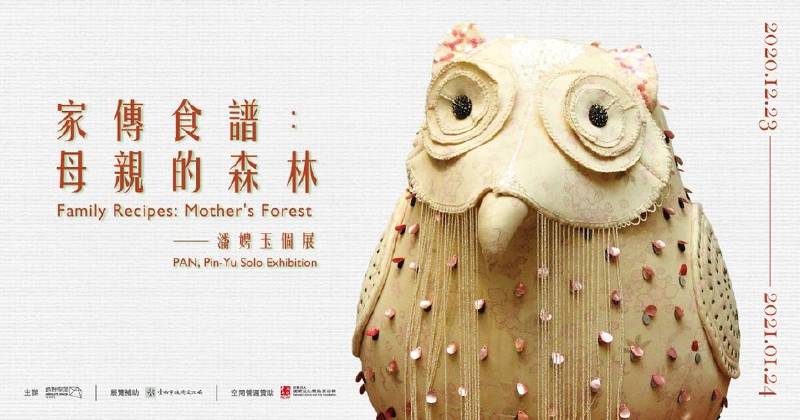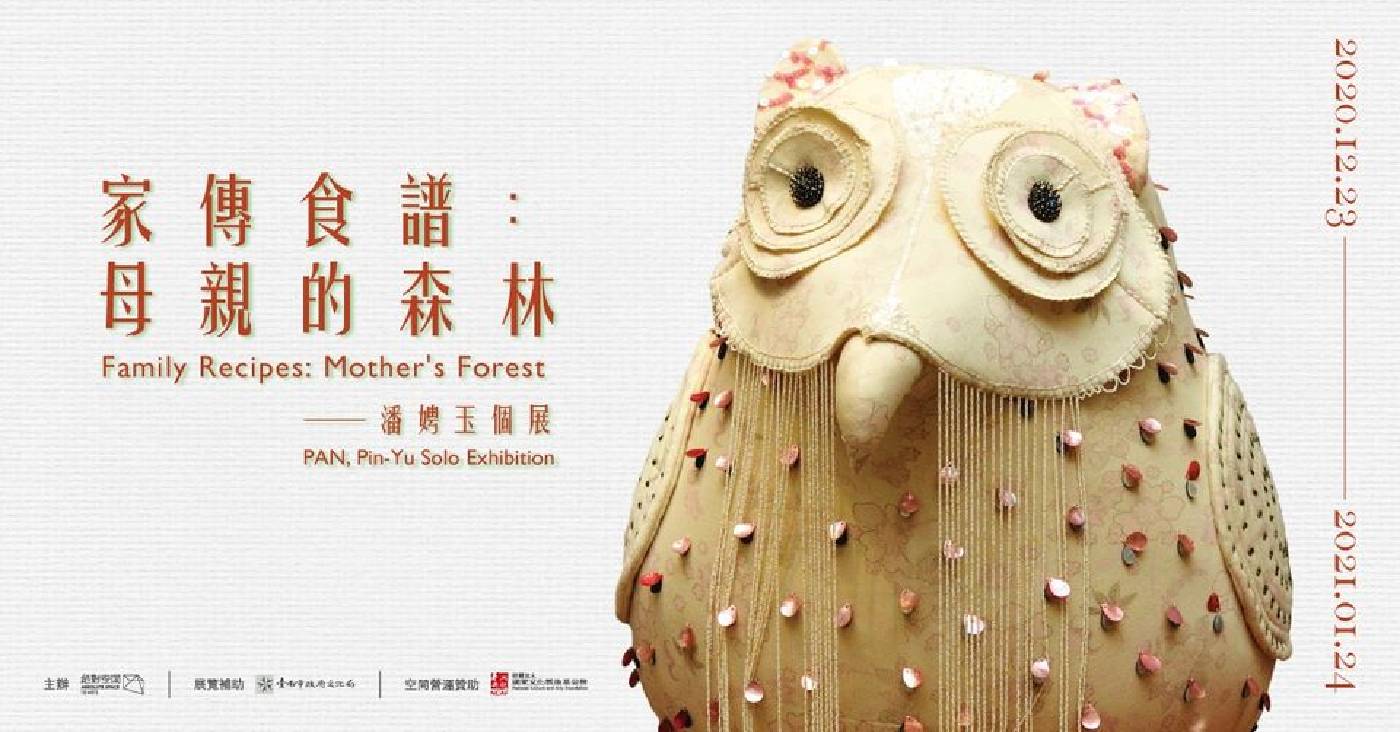絕對空間
【家傳食譜母親的森林—潘娉玉個展】Family Recipes: Mother's Forest - Ping-Yu PAN Solo Exhibition

-
展期
日期:2020-12-23 ~ 2021-01-24
-
地點
700台南市中西區民生路一段205巷11號
-
參展藝術家
潘娉玉
-
【家傳食譜:母親的森林—潘娉玉個展】
展期Date|2020.12.23 (Wed.)-2021.01.24(Sun.)
開幕茶會Opening|2020.12.26 (Sat.) 下午3:00
座談Forum|2020.12.26 (Sat.) 下午3:30-17:30
與談人Guest|沈伯丞 SHEN, Bo-Cheng
---
關於本展|
臺灣藝術家潘娉玉的創作,主要是在探討神話與當代生活的關係。她認為人類的集體神話,是由個體的生命故事所重疊而成的圖像。集體神話的原型(archetype),從過去到現在,持續地展示著某種微異(nuances)變化的發展性型態,召喚著我們對於人類所面臨的普遍性課題的認識。這種持續微異變化的發展性型態,即是「神話結構」。過去神話論述,大多強調原型的普遍性詮釋,以及原型典型重複發展的模式。在她的創作中,她強調:理解神話微異的動態結構,才能理解神話結構的意義。
神話的結構意義是說:神話原型的結構透過微異的作用,超越固有型態的限制,在整體上成為創造性的動態結構。這項微異作用的啟動,是透過生命創造性的參與和演譯,去突破典型的限制達成。原型的超越或是典範的超越,就是約翰•坎伯(Joseph Campbell)所稱的「英雄旅程」。神話予以我們的啟示:如何突破生命的限制、現實的限制,或是典範的限制,使我們「成為自己」-成為自己的英雄。神話結構意義,即是發現自我原型以及超越自我原型的旅程。
《家傳食譜》是體現她「神話結構」思維的一個系列性作品。在一次駐村計畫中,帶著一本母親的食譜,展開她離家最遠最久的行旅。帶著無比興奮心情,探索紐約藝術世界的她,怎麼樣也沒有想到,行李箱裡的食譜,成為在異鄉,與家鄉深刻情感的聯繫。《家傳食譜》系列作品,不只是從飲食談鄉愁,也試圖從生命經驗、從烹飪煮食,展開一系列對於家庭、歷史與文化議題的探索;因為家常菜它超越美食,它體現傳承、情感與文化。她以「家常菜」作為生命故事的線索,探討家庭故事的不同面向,也探討個人的敘事如何成為集體敘事。
《家傳食譜》顯然涉及文化傳統的傳承與創新,在此系列中,她也刻意以「美術的工藝復興」為策略,做為《家傳食譜》的平行議題。在後觀念藝術的時代,工藝能夠為美術或視覺藝術,恢復多樣性媒介語言的掌控能力,並且在「觀念-媒介語言-藝術作品」的架構中,提供實踐性面向的思維方法。此次在臺南絕對空間將展出此系列於2020年的新作《張凌食譜》、《金毛紅羽》(2019)以及《貓頭鷹姥姥》(2011-2020)、《天狗食月》(2016-2019)等四件作品,探討女性在家庭之中的角色。
關於藝術家潘娉玉|
目前創作及生活在臺北。國立臺南藝術學院造形藝術研究所碩士,現任國立臺北藝術大學美術系助理教授,專長複合媒材裝置與雕塑創作。曾獲美國亞洲文化協會獎學金、美國佛蒙特工作室藝術中心第九屆亞洲藝術家獎學金。2009年曾於臺北市立美術館舉行個展,並發表展覽同名作品集《永恆是情景的回復》;2013年於淡水藝術工坊展出「生命樹:歧異與歸屬」個展,2014年發行同名作品集。作品曾獲高雄市立美術館及國立臺北藝術大學關渡美術館典藏。
《家傳食譜》系列作品於2017年,分別在淡水海關碼頭與新竹關西七沁工作室,以及伊通公園(2020)以個展發表;此系列作品也陸續發表於臺東美術館「迴•游—尋找再棲地與物質記憶」(2019)、高雄市立美術館策畫之「再織:台灣當代纖維藝術展」旅美巡迴展(2017)、「當代藝術大觀:24道線索」(2016)、朱銘美術館「多重線索-2016 材質物語-纖維」、南投手工藝研究中心「織路染旅:臺灣當代纖維藝術的銳變」(2014)、首爾OCI美術館「創意報告書」駐村藝術家聯展(2014)等聯展。
從1996年迄今,已發表超過十次個展,其作品以聯展或駐地發表的方式,於臺灣各地、香港、首爾、紐約、波士頓、費城、舊金山等地發表展出。
主辦單位:絕對空間
空間營運贊助:國藝會
展覽贊助:臺南市政府文化局
---
Statement|
The artworks by Taiwanese artist Ping-Yu Pan primarily revolve around the relationship between myths and contemporary life. The artist believes that the collective myths created by human beings are in fact the images composed of superimposed individual life stories. The archetype of these collective myths has been demonstrating a formal evolution that proceeds by a series of nuances, which calls for our awareness of the fundamental issues that the humanity faced. Such an evolving form is exactly the structure of the collective myths. Previous discourses on the myths mainly put universal interpretations on their archetype and emphasized the archetype’s reproduction. Pan, in contrast, argues that we can comprehend the meaning of the mythical structure only by capturing the nuances of its dynamics.
The mythical structure connotes that the structure of the archetype has transcended the formal confines through its evolution proceeding by a series of nuances, and therefore become a creative, dynamic structure as a whole. The formal evolution requires the creative participation and deduction of life to transcend the limitations of the archetype. Transcending the archetype (or transcending the paradigm) represents a hero’s odyssey. The myths inspired us by showing how to transcend the confines of life, reality, or paradigm, allowing us to be ourselves, that is, to be our own heroes. In other words, the mythical structure refers to finding our own archetypes and transcending them.
Her series of works Family Recipes embody her thoughts about the mythical structure. In one of her experiences as an artist in residence, she brought one of her mother’s recipes with her and started the longest and furthest journey she’d ever had. Exploring the art world in New York with great excitement, she had never expected the recipe in her suitcase to become the strong emotional connection to her home. The Family Recipes series not only talk about nostalgia through food, but also intend to explore the issues about family, history and culture through life experiences and cooking; since family dishes aren’t just delicacies but the embodiment of inheritance, emotions and culture. With family dishes as the clues of life stories, she talks about the different dimensions of a family story and how individual narrations become collective.
Apparently Family Recipes involves the inheritance and innovation of culture and traditions. In this series, she intentionally uses “the Arts and Crafts Movements” as the parallel issue. In an era of post-conceptual art, craftsmanship can revive arts’ or visual arts’ ability to take control of multimedia languages, and provide the mindset of practical aspects for the “concept-media language-artwork” structure. This time in Tainan, Absolute Art Space exhibits four pieces in this series, including the 2020 new pieces Chang, Ling’s Kitchen, Mandarin Duck Cake (2019), Grandma Owl (2011-2020) and The myth of Lunar Eclipse (2016-2019), discussing the female roles in family.
About Ping-Yu PAN|
Works and lives in Taipei.
Ping Yu Pan earned her degree from the Graduate Institute of Plastic Arts at Tainan National University of the Arts in 1998, and is currently an assistant professor at Taipei National University of the Arts (TNUA). She has received grants from Asian Cultural Council and ROC-US Foundation for Scholarly Exchange, won the 9th Asian Artist Scholarship offered by Vermont Studio Center, and participated in artist-in-residency Program hosted by Headland Center for the Arts, Fine Arts Museum of San Francisco/de Young Museum, etc.
Pan possesses abundant domestic and foreign experience, and her work which consist chiefly of mixed-media sculpture or installations, explore the relationship between myths and contemporary life. Her recent project Family Recipes, Pan seeks to explore diffident dimensions of a family story with family dishes as the clues because family dishes not only embody but also perpetuate affections and culture, and are therefore more meaningful than delicacies. Furthermore, she attempts to capture the common image of mythical archetypes in different culinary cultures.
She has published two catalogues in 2009 and 2013, her work has been exhibited in many places in Taiwan, and among different international cities. Her work has also collected by Kaohsiung Museum of Fine Arts and Kuandu Museum of Fine Arts, Taipei National University of the Arts.
